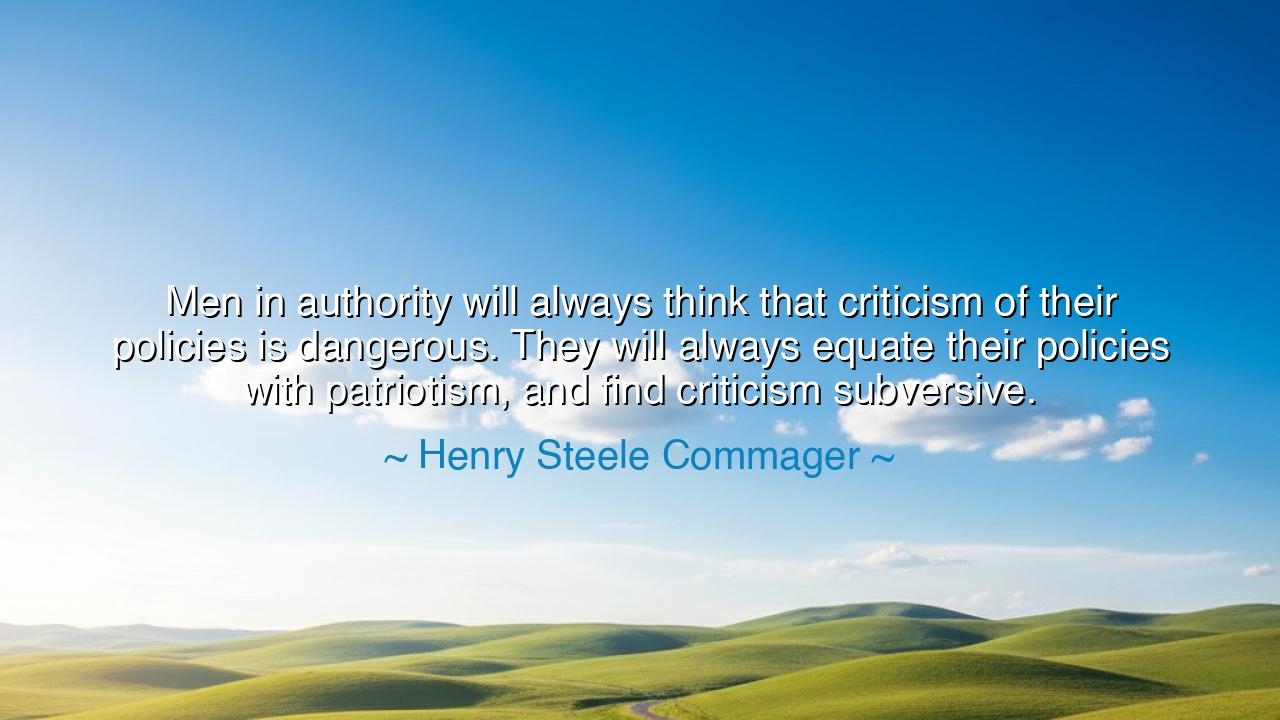
Men in authority will always think that criticism of their
Men in authority will always think that criticism of their policies is dangerous. They will always equate their policies with patriotism, and find criticism subversive.






“Men in authority will always think that criticism of their policies is dangerous. They will always equate their policies with patriotism, and find criticism subversive.” So declared Henry Steele Commager, a historian and a sage, with words carved from the granite of truth. In this saying lies an eternal warning: those who sit in power are ever tempted to see themselves as the embodiment of the nation, and to confuse loyalty to them with loyalty to the homeland. Yet history teaches us that patriotism is not measured by silence, but by the courage to speak when wrongs are being done.
For the authority of rulers is but a temporary stewardship; it is not the soul of the nation. Policies are the works of men, flawed and perishable. But patriotism belongs to the people, and to the eternal ideals of justice, freedom, and dignity. To challenge policies is not betrayal—it is the truest form of devotion, for it demands that the country live up to its highest callings. Those who cannot distinguish between obedience to authority and love of homeland mistake their own pride for the nation’s good.
Consider the example of President Abraham Lincoln during the Civil War. Though he carried the burden of preserving the Union, he faced harsh criticism, even from those who supported the cause of freedom. Many newspapers mocked him, generals doubted him, and citizens condemned his policies. Yet Lincoln did not silence them. He understood that the strength of a republic lay in its ability to endure dissent. True subversion would have been silence while the Union faltered. In allowing criticism, he preserved both the Union and the spirit of liberty.
But contrast this with the reign of King Louis XIV of France, who declared, “I am the state.” To him, criticism of the monarch was criticism of the nation itself. This blindness bred tyranny, and tyranny bred resentment. In time, the monarchy’s refusal to listen to criticism led to the French Revolution, where the anger of the people consumed the throne itself. Thus is Commager’s wisdom proven: when rulers see every question as rebellion, they sow the seeds of their own downfall.
The lesson is clear: criticism is not poison to a nation, but medicine. Bitter though it may taste, it heals the body politic. Without it, corruption festers, and the rulers grow deaf to truth. To love one’s country is not to remain silent when injustice is done, but to speak with courage, even when authority bristles and calls it subversion. The nation is greater than its rulers, and truth is greater than pride.
Therefore, let all who hear these words be steadfast. Do not fear to question policies that wound justice or betray freedom. Speak with respect, but speak with firmness. Remember always that your voice is a part of your patriotism, not its betrayal. A citizen who dares to hold authority accountable is more loyal than one who flatters rulers into ruin.
Practically, this means engaging in the life of your nation: vote with conscience, protest with dignity, and write with courage. Defend the freedom of speech not only for yourself but even for those with whom you disagree. Teach your children that the land they inherit will be stronger, not weaker, when its citizens dare to question power. In this way, you honor both your homeland and the eternal principles on which it stands.
So let Commager’s words ring across the ages: rulers will always mistake dissent for disloyalty. But remember, children, that patriotism lies not in silence, but in the brave cry for truth. Speak, therefore, not to destroy, but to preserve; not to betray, but to redeem. And by your courage, the nation will endure, purified by criticism, strengthened by honesty, and kept alive by the fire of freedom.






AAdministratorAdministrator
Welcome, honored guests. Please leave a comment, we will respond soon